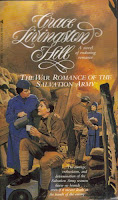The title of this book is a bit misleading. I've owned it for years, but apparently never read it, because somehow I thought it was a collection of fictional short stories about the Salvation Army during the war, and it's really nothing like that. Instead, it is a factual, anecdotal account of the work of the Salvation Army with the soldiers in France during World War I, pieced together from journals and letters from the people who were over there. Most of the anecdotes are very brief, a page or two at most, so there's not a lot of continuity; stories are organized by region and apparently by some kind of chronology, although this is not obvious. At times it feels like propaganda, as anyone who speaks ill of the Salvation Army soon comes to love and respect them, and the "lassies" are all pure of heart and motive-- and apparently most of their work involved making doughnuts and pies to give the lonely soldiers a taste of home. Still, it was interesting to get a very different perspective on the war and the living conditions near the front-- as Hill points out repeatedly, the Salvation Army workers went as near to the front as they were able, and endured the hardships along with the "doughboys" rather than associating with the officers.
There's a section at the beginning about "Commander" Evangeline Booth raising money and support to send her people to Europe (when someone asks where the Salvation Army is, she somehow correctly intuits it is a spy trying to find out where the American troops are), a bit at the end about the work of the Salvation Army for soldiers returning home, and then a long section at the end full of letters from presidents and governors endorsing the Salvation Army, and then from military people of every rank thanking them for their work. These are interesting, but they also make the book feel even less consistent.
I felt like this would have been a much stronger and more compelling story if Hill had taken all the anecdotes and stories and threaded them into a fictionalized account, creating a few characters that the reader could follow throughout, rather than jumping back and forth to unnamed people. And the moments when she talks about the Salvation Army "lassies" and heroes the way she describes the heroines in her fiction-- in spite of their blond curls and pretty faces, if you look into their eyes you just know how sweet and dedicated they are, etc. These kind of descriptions are silly enough in her fiction, but here in what is otherwise almost too dryly factual, it stands out even more.
Couldn't figure out how to classify this one-- it's not fiction, but I'm not sure it really counts as history either.
| Title: | The War Romance of the Salvation Army |
|---|---|
| Author: | Grace Livingston Hill |
| Date published: | 1919 |
| Genre: | History ? |
| Number of pages: | 327 |






